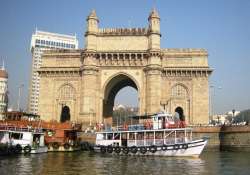At $8 billion, Mumbai faces largest GDP exposure to terror: Report
Mumbai: The megapolis has the largest exposure to terrorism at almost $8 billion and the second highest exposure to power outages with $1.92 billion of GDP at risk among the large global cities, says a

Mumbai: The megapolis has the largest exposure to terrorism at almost $8 billion and the second highest exposure to power outages with $1.92 billion of GDP at risk among the large global cities, says a report.
Mumbai has the largest risk with a $47.38 billion worth of exposure and almost one quarter of the city's potential losses are related to pandemic risks, followed by terrorism at 16.77 per cent, market crash at 12.94 per cent and floods at 12.89 per cent, the global insurance major Lloyd's said today citing its report 'City Risk Index'.
The study presents the first-ever analysis of economic output at risk in 301 major cities from 18 man made and natural threats over a 10-year period. India's 10 largest urban centres of economic growth have $179.8 billion worth at risk from a series of threats over the next decade.
Across the 10 cities combined, the largest economic exposure is to pandemic risks, which could put $39.65 billion at risk, followed by floods at $33.84 billion, market crash at $21.13 billion, oil price spike at $20.81 billion and terrorism at $16.07 billion.
Catastrophes caused by natural events such as extreme weather, pandemics and plant epidemics account for just over half ($98.1 billion) at risk in the 10 cities, it said.
The city risk index says Ahmedabad, Bangalore, Delhi, Chennai, Hyderabad, Kanpur, Kolkata, Mumbai, Pune and Surat together will generate an average annual GDP of $1.4 trillion in the coming decade. However, 12.6 per cent of this growth is at risk from the combination of 18 manmade and natural threats.
"The city risk index highlights the economic exposure of 301 major cities across the world. Governments and businesses, together with insurers, must work together to ensure that this exposure - and the potential for losses - is reduced," Lloyd's Director (Global Markets) Vincent Vandendael said while unveiling the report here.
"Insurers, governments, businesses and communities need to think about how they can improve the resilience of infrastructure and institutions. Insurance is part of the solution," he added.
Later, talking about Llyod's plans to enter India, Vandendael said, "We're in dialogue with the regulator Irdai to explain them our nature of business. We are a market for speciality products and operate through syndicates."
"In what form shall we enter Indian market is yet to be decided. But lots of syndicates are keen to be part of our Indian operation and we will also introduce products for local market in India like cyber insurance."